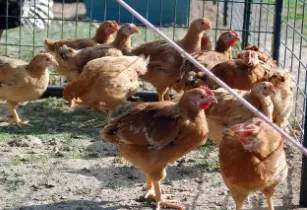Nan-Dirk Mulder, global animal protein specialist, Rabobank, offered a macro perspective on challenges and opportunities in the African poultry market at the Invest in Africa session at VIV Europe
He said the African poultry market is currently worth $US15bn and named 10 countries - Nigeria, Ghana, Cote d'Ivoire, Uganda, Senegal, Angola, Malawi, Rwanda, Kenya and Ethiopia - as the growing markets on the continent, all with expected year-on-year growth in the range of 6 to 10 per cent between 2015 and 2025.
"The potential is there but the yields are still low," was Mr Mulder's summary of the African poultry market. However, he said that the pan-African trend of increased urbanisation was an opportunity for investors because "people who live in cities need agriculture". Nairobi, Lusaka and Kigali were mentioned as cities where the market for agricultural produce "to feed all the people" was strong.
He said that in the past 15 years, the average daily income for the continent had increased from $US0.90 per day to $US1.30 per day. The growing middle class of African countries, along with the rise of bigger grocery stores and supermarkets will also fuel growth for the poultry market. In Nigeria, in particular, the middle class continues to grow despite a slowdown in the oil industry, which is the backbone of the Nigerian economy. He added that Ethiopia has experienced real GDP growth of 10 per cent per year between 2016 and 2018.
With 45 per cent of the world's unused agricultural land in sub-Saharan Africa, there is great potential for the poultry industry to grow, according to Mr Mulder.
Additionally, shifting public tastes towards chicken meat and eggs across multiple African countries should stimulate growth. Compared to the production of beef, pork and salmon, Mr Mulder said the benefits of entering the poultry market include the short production cycle and potential for cashflow after just six weeks. With chicken being a cheap source of protein, this makes it an attractive option for consumers and "it should be easy to finance".
With more than 80 per cent of Africa's poultry products coming from outside the continent, Mr Mulder called for an "emphasis on local industries". He cited Angola and Ghana as two countries focusing on achieving self-sufficiency for agricultural products. In regard to the overall ambition to reduce imports, Mr Mulder said that governments are "realising more and more that agriculture is important" and longer-term strategies are required, particularly in West Africa, where the market is most exposed to cheap imports from Brazil, the EU and the US.
Investing along the entire value chain and working towards "international synergy" with smaller African countries working together were put forward as important strategies by Mr Mulder.
"Companies can mitigate risks of operating by being in more countries," Mr Mulder said. "If there is a risk in one country, you can still do business in another country [in Africa]."
"There are always challenges in the business," Mr Mulder told delegates. He listed factors such as land ownership, corruption, FX volatility, access to cold storage and lack of infrastructure as issues to be aware of, advising potential investors to "identify the right markets with in-depth analysis of all the potentials."
He said that access to finance is important and for investors to examine "the competitive position of countries".
In regard to distribution, Mr Mulder said Africa's growing middle class - those with an annual income between $US5,000 and $US10,000 and rising - will be the target market, particularly with an increase in supermarket shopping within this demographic. The growth of chain restaurants, such as KFC, McDonalds, Wimpy and Steers, will also stimulate the poultry market in multiple African countries. This growth changes distribution patterns and the cold chain needs to be strengthened, representing another investment opportunity.
"It's a different dynamic in the African market [and it is important to] organise the supply chain in the region ... setting up successful businesses along the value chain."
Mr Mulder said that this can be "capital-intensive but it may be the only option."
"There is a shift to modern feeds but [the industry] has to create scale."
He said feed grains are a "really important element" of the value chain and urged investment in mills and grain supply businesses. With underused arable land in Africa, Mr Mukder said farmland for feed grain could be doubled "without touching sensitive environmental areas."
If companies invest in grain technology, Mr Mulder said feed will be of better quality and available at better prices.
Poultry processing was raised as another investment opportunity by Mr Mulder. He said that currently 80 to 90 per cent if the chicken meat market across Africa is still via the sale of live birds. As such, better processing facilities and cold chain innovation are needed so that more chicken meat can be sold through supermarkets, chain restaurants and hotels. He added that slaughterhouses need to be modernised with "more sophisticated equipment".
Investment in hatcheries within Africa will also stimulate the market, according to Mr Mulder, with big investment needed to achieve economies of scale. He cited South Africa as the continent's most efficient poultry market with "regional hubs" developing gradually. Demand for chicken in neighbouring Senegal and Mauritania, as well as trade between Cote d'Ivoire, Benin, Nigeria and Ghana represent regional opportunities, for example.
In conclusion, Mr Mulder said that joint ventures with local partners are a "good idea".





